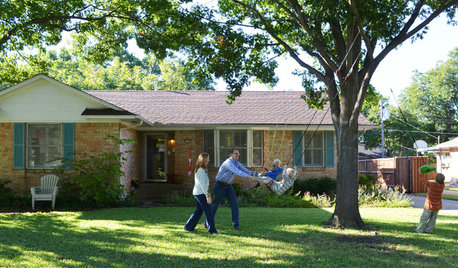Foreclosures in Michigan - finding solutions
Nancy in Mich
17 years ago
Related Stories

BEFORE AND AFTERSHouzz Tour: A Georgia Foreclosure Gets a Major Overhaul
Gutting and redesigning turn a mishmash 1925 home into a unified haven with better flow
Full Story
MOVINGHouse Hunting: Find Your Just-Right Size Home
Learn the reasons to go bigger or smaller and how to decide how much space you’ll really need in your next home
Full Story
VACATION HOMESHouzz Tour: More Room to Relax in a Michigan Retreat
Tired of cramming their family and friends into a compact space, a family adds a guesthouse and an addition big enough for a crowd
Full Story
GARDENING GUIDESGardening Solutions for Dry, Sandy Soils
Has your desert or beachy site withered your gardening creativity? Try these ideas for a beautiful, easy-care landscape
Full Story
HOUZZ TOURSMy Houzz: A Surprisingly Light Lakeside Log Cabin
Light gray paint and lots of natural light take this cabin on a Michigan lake out of moody country
Full Story
GARDENING AND LANDSCAPINGDouble Take: This Outdoor Screen Makes Game Day a Snap
A Michigan family goes long and wide on their backyard party central with a supersize screen, fire pits and lounging for a crowd
Full Story
DESIGN DETAILSThe Secret to Pocket Doors' Success
Pocket doors can be genius solutions for all kinds of rooms — but it’s the hardware that makes all the difference. See why
Full Story
THE ART OF ARCHITECTUREDesign Practice: 11 Ways Architects Can Overcome Creative Blocks
When inspiration remains elusive, consider these strategies for finding your creative muse
Full Story
BEDROOMSGet More From Your Bed (Storage, for Starters)
Find space for all your stuff — and maybe even a seat, a writing desk or another sleep spot — by cozying up to a multipurpose bed
Full Story
ARCHITECTUREHave Your Flat Roof and Your Snow Too
Laboring under the delusion that flat roofs are leaky, expensive and a pain to maintain? Find out the truth here
Full StorySponsored
Columbus Area's Luxury Design Build Firm | 17x Best of Houzz Winner!






margenorman
housenewbie
Related Discussions
I can't find a Michigan Bulb/Jackson and Perkins connection
Q
Anyone bought from Michigan's Bulb before?
Q
People stripping house before foreclosure
Q
Foreclosure Kitchen is Missing (Need Help With Layout)
Q
quandary
cpowers21
qdognj
galore2112
sellerohboy
qdognj
feedingfrenzy
feedingfrenzy
Denise Evans
qdognj
galore2112
feedingfrenzy
qdognj
qdognj
feedingfrenzy
qdognj
feedingfrenzy
galore2112
dave_donhoff
qdognj
Nancy in MichOriginal Author
ultraviolet
Nancy in MichOriginal Author
pkguy
quip
dave_donhoff
C Marlin
dave_donhoff
C Marlin